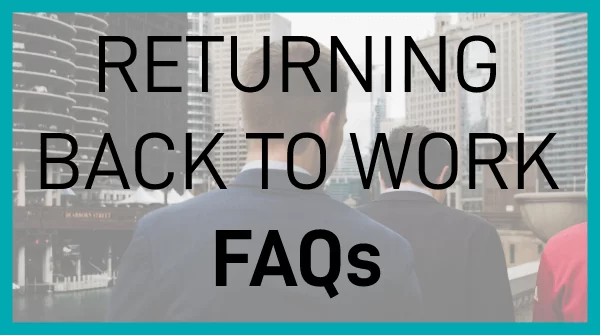
As businesses start to re-open, businesses will be faced with staffing issues.
Returning to work is likely to be ramped up as guidance changes. The current guidance is still that those who can work from home should continue to do so & those who can’t work from home are encouraged to work/return to work.
Businesses need to make sure that they ‘manage’ the transition back to ‘normal’ safely, sensitively and carefully as there are likely to be a number of new ‘issues’ to consider. Bear in mind employees may have been working at home, laid off, furloughed for a significant period of time – possibly two or three months (depending on when the restrictions are lifted) and so there will need to be a period of adjustment.
https://www.hse.gov.uk/simple-health-safety/risk/index.htm
You should also ensure that you consider if you use shared buildings / serviced offices that you have checked the measures that the landlord or building provider has put in place to ensure that the Government guidance is being adhered to. There is sector-specific advice for example in construction and restaurants offering takeaway facilities.
(i) Requests to work from home either completely or in part;
(ii) Requests for adjusted hours/days worked per week;
For employees who have been working from home, they may have found benefits of not having to commute, being able to spend more time with family so we anticipate that businesses will receive requests for flexible working which may include working from home in full or in part, requesting adjusting working hours or days.
If an employee has been able to work from home with little or no problems, then it may be difficult for an employer to argue against an application to work from home. However, any application must be balanced against the needs of the business, but I would suspect an outright refusal is likely to be appealed by the employee.
Employees may also request different hours of work as they may have found a significant benefit in for example starting earlier and finishing earlier but still working their normal number of hours but just working in a different way.
Employees may need to take time off for either child who has not returned to school or family members who need caring for. The Government guidelines say that staff in this situation can still continue to be furloughed. You may need to re-assess the position in the summer holidays as staff should have made plans for the summer holidays in any event. However, this may depend on the latest Government guidance at the time. If, for example, grandparents are unable to care for grandchildren, then an employee may say that the plans they had in place are no longer available. Similarly, if summer clubs are taking fewer children than they would normally, an employee may be in a difficult situation if they are unable to put in place the plans they would have had but for COVID.
In these circumstances, again, it will be very much a ‘wait and see’ situation as the Government guidance changes.
This primarily relates to those who have been furloughed and are now being asked to come back to the business. If the business has carried out the required risk assessments then there is no real reason why the employee should not come back to work. This will then be unauthorised leave and a conduct issue which may lead to disciplinary.
It is the employer’s decision as to who they should furlough therefore it is not up to the employee to request to be furloughed. As with 1) above, if there is work to be done, then furlough does not apply as furlough is only in place of what would normally be a ‘lay off’ situation.
This is a natural concern for anyone at present. You have to listen to the employee’s concerns but again, if you have carried out a sufficient risk assessment then there is no reason for the employee to not return to work.
An employee can refuse to return to work if they have a reasonable belief that their workplace is unsafe under section 44 of the Health & Safety at Work Act 1996. However, again, if you have carried out a COVID-19 return to work risk assessment then
This would fall under the normal care of dependency rules. However, the COVID situation would be deemed an ‘ongoing emergency’ so there is the potential that if time off is refused, this could lead to constructive dismissal or discrimination claims. We would, therefore, advise caution if an employee is saying that they cannot come back to work due to caring responsibilities. Also, Government guidance says that staff can continue to be furloughed if they have caring responsibilities.
Long-term sickness. This should be managed in accordance with the normal long-term sickness process which would include welfare meetings, Occupational Health referrals and then ongoing management;
Employers should not expect those on long term sickness to return to work as normal and they should be managed as they would normally.
We know for a lot of UK businesses you will be planning on returning back to the workplace in the near future. Whether you already have or will be returning in the coming weeks we have prepared a 20-question checklist to ensure your workplace is safe for operation under current regulations.
Please fill in your details on the form below to receive a copy of this checklist that will help you to best identify any changes that may need to be made ahead of your return.
Error: Contact form not found.
If you are thinking about re-opening your business, it is a necessity you thoroughly assess the COVID19 safety of your workplace.
If you do not have our Health and Safety service as part of your package and would be interested in upgrading please contact us using our contact information below.
E: contact@highperformanceconsultancy.com
T: 0844 800 5932
Twitter: @HPC_HRservices